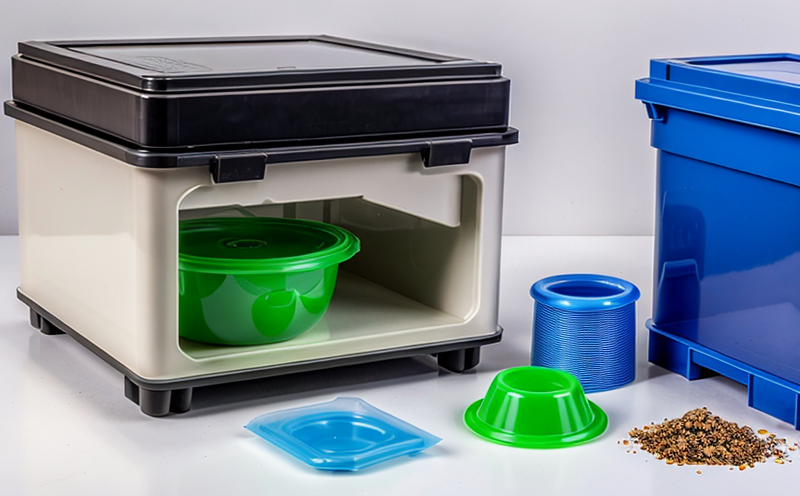ISO 4180 Plastics Packaging Distribution Simulation Testing
The ISO 4180 standard is a pivotal specification designed to evaluate the resistance of plastics and their derivatives used in packaging under simulated distribution conditions. This testing is crucial for quality managers, compliance officers, R&D engineers, and procurement teams as it ensures that packaging materials can withstand real-world handling, storage, and transport environments without compromising safety or integrity.
The process involves subjecting specimens to a series of mechanical stresses mimicking the typical distribution processes. These include stacking, palletizing, and forklift handling, all conducted over multiple cycles to replicate the harsh conditions packaging might face in transit. The standard also considers environmental factors such as temperature variations and humidity levels that can impact the performance of packaging materials.
For plastics used in food packaging, this testing is particularly important due to the stringent hygiene requirements. Compliance with ISO 4180 ensures that the packaging maintains its structural integrity and does not leach harmful substances into the contents during distribution. This testing is essential for maintaining product safety standards as stipulated by international regulations like EU Directive 2019/1025 on Plastics Used in Food Contact.
The methodology involves a series of steps to ensure accurate simulation: - Specimens are prepared according to the specified dimensions and weight. - The specimens undergo stacking, palletizing, and forklift handling cycles. - Testing is conducted at various temperature and humidity conditions. - The specimens are observed for any signs of damage or deformation post-testing.
The results from this testing provide critical insights into the durability and reliability of packaging materials. This information is invaluable for R&D teams to refine their products, ensuring they meet both functional requirements and regulatory standards. Compliance officers can use these test results to ensure ongoing adherence to international and local regulations, thus avoiding costly recalls or legal issues.
For procurement teams, the outcomes of ISO 4180 testing offer a reliable basis for selecting suppliers who adhere to high-quality standards. This testing not only enhances product safety but also contributes to sustainability efforts by identifying more robust materials that can withstand harsher conditions without compromising environmental impact.
Benefits
The benefits of ISO 4180 Plastics Packaging Distribution Simulation Testing extend beyond mere compliance with regulatory standards. It provides a comprehensive evaluation of packaging materials, ensuring they can withstand the rigors of distribution without compromising safety or integrity.
Firstly, this testing enhances product quality by identifying potential weaknesses in the design and manufacturing process early on. Quality managers can use these insights to improve product performance and reliability. Secondly, it aids compliance officers in maintaining adherence to international regulations like EU Directive 2019/1025, thereby avoiding costly fines or legal issues.
For R&D engineers, this testing offers a valuable tool for innovation. By identifying the maximum stresses that packaging materials can endure, they can design more efficient and durable products. This not only enhances product safety but also contributes to sustainability efforts by encouraging the use of robust materials that require less frequent replacements.
Procurement teams benefit from this testing as it allows them to select suppliers who adhere to high-quality standards. By choosing suppliers who pass ISO 4180 tests, they ensure consistency in product quality and reliability across their supply chain. This can lead to cost savings through reduced waste and fewer returns.
Finally, the results of this testing contribute to sustainability efforts by identifying materials that are more robust yet eco-friendly. By using such materials, businesses not only enhance product safety but also reduce their environmental footprint.
Eurolab Advantages
Eurolab stands out in the field of plastics packaging testing due to its comprehensive approach and state-of-the-art facilities. Our team of experts ensures that every test conducted adheres strictly to ISO standards, providing clients with reliable and accurate results.
Our advanced equipment allows us to simulate a wide range of distribution conditions, from extreme temperature variations to high humidity levels, ensuring that our tests are as realistic as possible. This not only enhances the accuracy of our testing but also provides valuable insights into how packaging materials perform under real-world conditions.
We offer a full suite of services, including specimen preparation and analysis, making it easier for clients to manage their testing needs in-house. Our team is equipped with the knowledge and expertise to provide guidance on best practices and regulatory compliance, ensuring that our clients are always up-to-date with the latest standards.
In addition to our technical capabilities, Eurolab prides itself on providing personalized service tailored to each client's unique needs. We understand that every business has different requirements, and we work closely with clients to ensure they receive the most relevant and valuable testing services.
Environmental and Sustainability Contributions
The ISO 4180 standard plays a crucial role in promoting environmental sustainability by ensuring that packaging materials are robust enough to withstand harsh distribution conditions without compromising safety or integrity. This is particularly important for food packaging, where the risk of contamination is high.
By identifying and addressing potential weaknesses early on through comprehensive testing, businesses can make informed decisions about their packaging design and manufacturing processes. This not only enhances product quality but also contributes to sustainability efforts by encouraging the use of robust materials that require less frequent replacements.
The results of ISO 4180 testing provide valuable insights into how packaging materials perform under real-world conditions, enabling businesses to make informed decisions about their environmental impact. By selecting suppliers who pass these tests, procurement teams can ensure consistency in product quality and reliability across their supply chain, leading to reduced waste and fewer returns.
Eurolab's commitment to environmental sustainability is reflected in our advanced equipment and state-of-the-art facilities. We are proud to offer a full suite of services that cater to the diverse needs of our clients, ensuring they receive reliable and accurate testing results.





